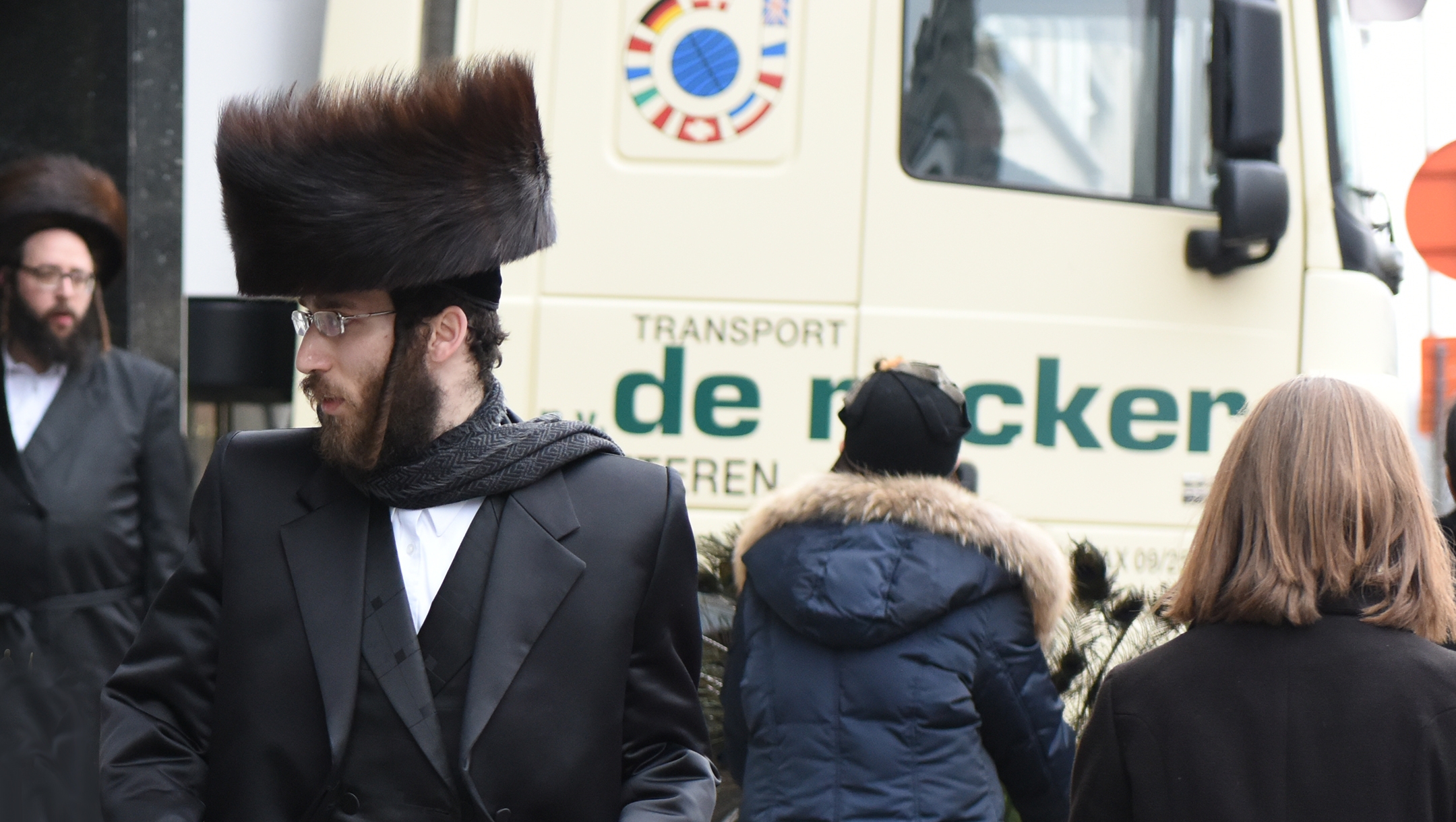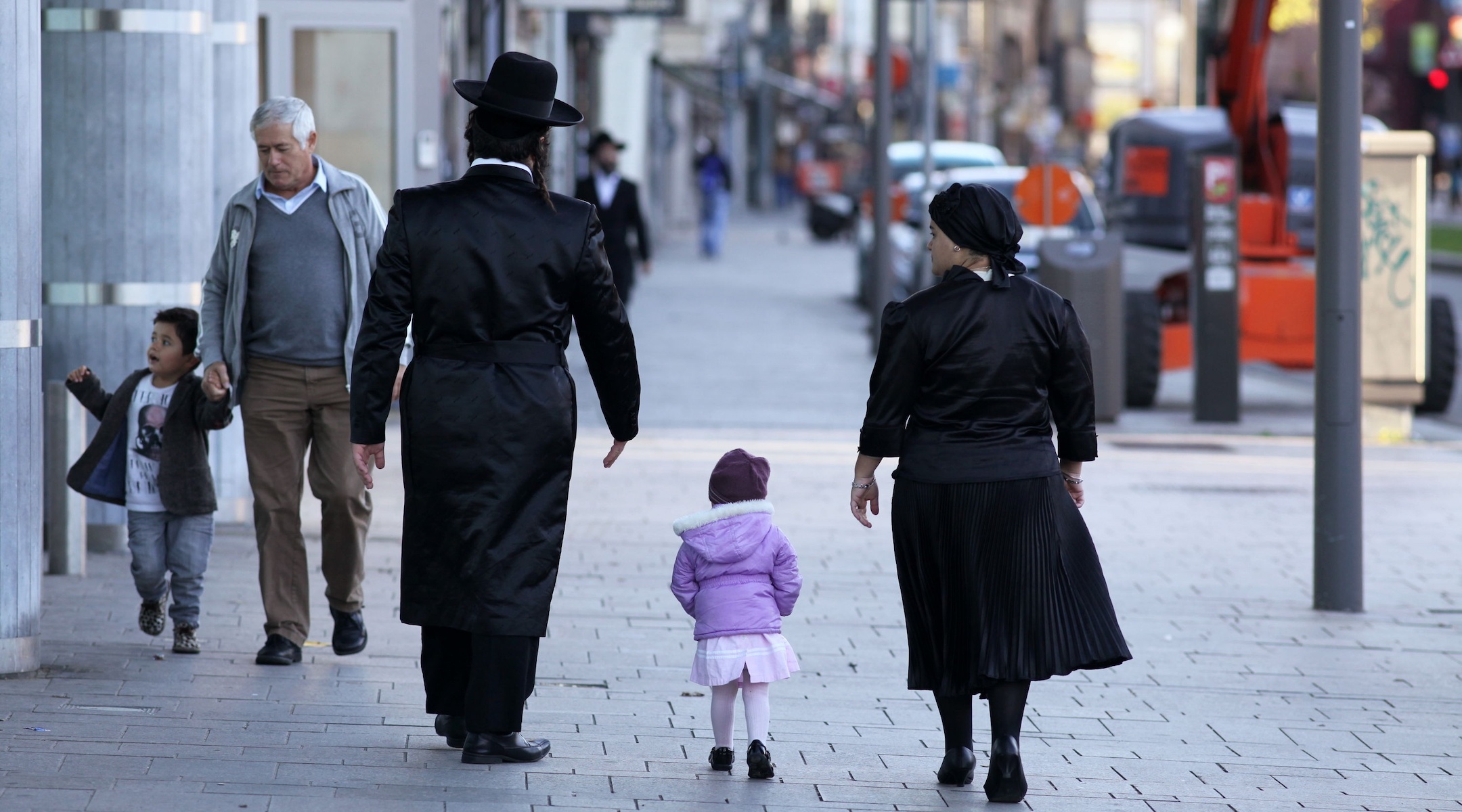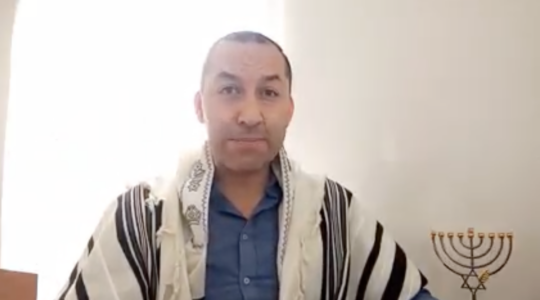(JTA) — Most of the 20,000 or so haredi Orthodox Jews in Antwerp, Belgium, live close to one another in a centrally located neighborhood, an area of about 20 narrow streets that borders the city’s main railroad station.
While many Orthodox communities around the world have struggled during the coronavirus pandemic to gather minyans — groups of 10 or more worshippers required by Jewish law to recite certain public prayers — many Antwerp Jews developed a hack to do so: gathering on their apartment balconies.
For months, the Jewish neighbors have recited prayers with each other from balcony to balcony. The sound was so loud at times that non-Jewish neighbors complained to police, the Gazet van Antwerpen reported. Some even placed a Torah scroll in a courtyard visible from hundreds of apartments on the same block, said Rabbi Pinchas Kornfeld, secretary-general of Machsike Hadas, Antwerp’s main religious community.
“We have three minyanim on my street alone,” Kornfeld said. “Of course I miss synagogue, it’s a place of reflection, social interaction, belonging. But these balcony minyanim give normalcy, they kept the rhythm of life and the ability to pray.”
This unique setting could be one reason why the city’s Orthodox community avoided the COVID-19 catastrophe that it was worried about.
The community projected in March that 85% of its members could contract the coronavirus because of its close conditions and frequent social interactions, and that over 500 could die. A communal taboo about dealing with the virus, which some labeled as a scourge of the secular world, added to the danger.
Yet Antwerp’s Jewish community has weathered the pandemic — one that has killed about 10,000 of their compatriots, giving Belgium the world’s highest per capita COVID-19 death rate (behind the microstate San Marino) — surprisingly well. To date, 11 people from the city’s Jewish community have succumbed to the disease, all of them aged or having suffered from preexisting medical issues, communal leaders told the Jewish Telegraphic Agency.
Community members believe that the responsible leadership of their rabbis and their followers’ discipline in following orders stemmed the spread of the virus.
“We are blessed in that we have rabbis that gave clear instructions and community members who listened,” said Shlomo Stroh, a 38-year-old community activist and father of seven children.
But at first, the opposite seemed to be happening. The community’s own dire projection was influenced by the fact that some members seemed to be flouting government instructions to isolate and refrain from group prayer.
At one point, Shmulie Markowitz, head of the Hatzole Antwerp Jewish community emergency and rescue unit, sent a WhatsApp message to many Antwerp Jews urging them to respect rules that prohibited more than 10 people from occupying the same space at a store.
“People push in, and they bring their children with them, and this must stop,” he said in the message.

Haredi Orthodox Jews walk in Antwerp, Belgium, March 16, 2016. (Cnaan Liphshiz)
The community also at first downplayed the danger of the virus.
“People call it ‘the disease’ or they say they have ‘fallen ill,’ but there’s a taboo, a stigma on it and a sense of shame around it,” Martin Rosenblum, a doctor there with several haredi Orthodox patients, told JTA in April. “It means that some people with the virus wait until they’re in really bad shape before they try to go to hospital or get help.”
But the community took swift action following the death rate projection, implementing strict social distancing measures that included the closure of all synagogues on March 13 — five days before federal authorities imposed a nationwide lockdown.
“It’s just a few days, but with a pandemic that grows exponentially it was a crucial early step,” said Stroh, who was involved in the decision-making process led by the city’s chief rabbi, Aaron Schiff, and the city’s beit din, or rabbinical court.
Getting the Orthodox Jewish community of Antwerp to adhere to social distancing was a “gradual process,” according to Claude Marinower, an alderman in charge of the city government’s communications efforts, among other portfolios.
“At first there was some pushback” from some community members against the closure of synagogues, said Marinower, who is Jewish but is not Orthodox. But “there was more cooperation as the dimensions of the pandemic emerged — and especially in Belgium, where about 10,000 people have died of the coronavirus.”
“When rabbis issued strong instructions against gatherings, it was accepted by all,” Marinower said.
Michael Freilich, an Orthodox Jewish lawmaker from Antwerp who serves in the federal parliament, also attributed the low death rate among Jews to a combination of rabbinical leadership and authorities’ strict enforcement. Together, he told JTA, “it meant we were saved from disaster.”
The efforts weren’t always easy. On March 15, more than 20 students at a yeshiva, a religious seminary, barricaded themselves inside a synagogue when the police asked them to come out and maintain social distancing, HLN reported. They eventually let the officers enter.
Dozens of fines have been handed out to people from the Orthodox community for failing to stay indoors, or for congregating for minyan or at grocery stores, one member of the community told the Jewish Telegraphic Agency on condition of anonymity. The source added that police led the way in the social distancing effort, not the rabbis.
“The real reason we were spared of many deaths was the very strict guidelines by the authorities and the strict enforcement of the rules by police,” the source said. “So yes, the rabbis played a role, but only after they had no choice to do otherwise.”
Other influential rabbis around the world have been less consistent in their messaging to community members.
Rabbi Chaim Kanievsky, an Israel-based leader of Litvak Jews in that country and beyond, ordered strictly Orthodox schools in Israel to ignore the Health Ministry shutdown orders on March 18. He would order those schools closed on March 29.
Others gave social distancing decrees that often were ignored, including in the London neighborhood of Stamford Hill, where many Orthodox members have close family ties with members of the Antwerp community. As in the United States, police in the United Kingdom have stepped in multiple times to break up gatherings of Orthodox Jews, including at weddings and prayer groups.
Another factor that aided Antwerp Jews was their unity. As Stroh explained, Stamford Hill is “too big,” with too many separate Jewish sects. It was harder to get them all on the same page.
“Antwerp also has fringes, like the Satmar [Hasidic dynasty] and others, but none are big enough [to go it alone],” Stroh said.
Rabbi Kornfeld said the layout and demography of the Jewish community of Antwerp certainly helped keep up morale as well and made it easier for members to observe the social distancing measures and synagogue shutdowns.
Typically, a prominent member of the community or a local cantor from the block would read aloud from a Torah scroll that he took to the center of an interior yard. Dozens of residents prayed from the balconies upstairs with the reader.
Although some complained about the noise, neighborhood resident Barbara Pieters told the Gazet van Antwerpen that she enjoyed the balcony prayers.
“Usually we go to concerts, now we get them in our yard,” she said. “It’s interesting to hear what usually only goes on at synagogue.”
JTA has documented Jewish history in real-time for over a century. Keep our journalism strong by joining us in supporting independent, award-winning reporting.






